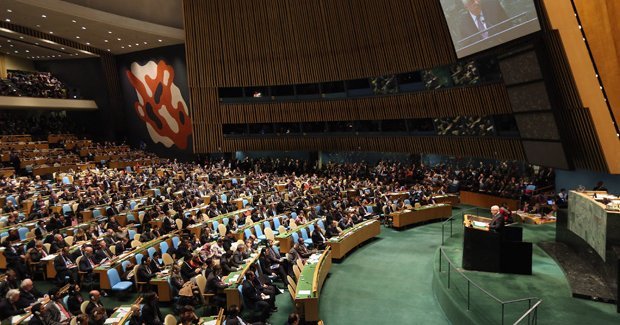The vote was followed by celebrations across the West Bank but Israel claims it has not been a move forward. People in Palestine feel the vote gives them more freedom because apart from adding strength to the road in acclaiming peace, it has also substantially relaxed the restrictive bilateral negotiations. One of Palestine’s primary necessities for continuing negotiations with Israel has been UN recognition of a Palestinian state in the West bank, Gaza and East Jerusalem. Hamas, the militant Islamist group which has governed Gaza since 2007, braces diplomatic efforts as well.
The UN General Assembly voted 138-9 to acknowledge Palestine as a non-member state, with 41 nations abstaining. This garners diplomatic recognition on near about the same level as the Vatican, a sovereign entity. France, Italy, Spain, Turkey, Russia and China supported Palestine’s bid for statehood, but the United States, along with Czech Republic, Israel, Canada, Panama, and several Pacific island nations, chose to vote against it. Due to recognition from approximately 150 nations, the Palestinian Authority is currently a non-member observer state, an upgrade from its non-member observer status. Full membership as an independent Palestinian state will require backing from the UN Security Council but United States has said it would veto this Palestinian resolution.
Europe seems to be divided on the issue of US foreign policy in the Gaza conflict. Britain, Netherlands, Lithuania and Germany chose abstention. Germany has being a strong ally of Israel since the Holocaust and this makes for a welcome positive shift in perspective for the nation. Countries across Europe should pursue the European agenda here and steadily support a two-state solution for the settlements. Although the EU is Palestine’s largest political and financial supporter, the Venice Declaration (1980), which acknowledges Palestine’s right to self-government and the Palestinian Liberation Organization’s right to be associated with peace initiatives, demands a greater involvement by the EU, in the region.
There is no doubt over the fact that the UN vote has deepened Israel’s diplomatic isolation. The Jewish state’s settlers and soldiers evacuated from Gaza in 2005 and Prime Minister Benjamin Netanyahu has labeled Israel under international law, to not be the region’s occupier any longer. Catastrophic events have already taken place in response to the vote with the seizing of more than £75m in tax revenues Israel collects on behalf of the Palestinian Authority. An announcement has also been made of a big settlement expansion programme for Israel, with the building of 3,000 new homes in areas across the pre-1967 Green Line, attempting to curtail the Arab population. Meanwhile, the decision to pursue development of the E1 area, which would effectively close off the prospective capital of Palestine, East Jerusalem, from the West Bank, has been reprehended by the United States and Britain.
The 65 year old conflict over territory and sovereignty between the Arab and the Jewish people started with Israel occupying the West Bank, East Jerusalem and the Gaza Strip, during the Six Day War (1967). The Oslo Accord (1993) charted the recognition of both states but peace talks ever since have been unable to result in a permanent settlement for Palestinians. A diplomatic plan of action for Palestine has been asking nations to recognize an independent Palestinian state with borders following the ceasefire lines which separated Israel and the West bank before June 1967.
A fundamental reason why Netanyahu does not accept these territorial lines is that despite it being illegal under international law, about half a million Jews live in more than 200 settlements and outposts in the West Bank, including East Jerusalem. For the meantime, President Mahmoud Abbas is more concerned with the violent behaviour of some settlers who have attacked their Palestinian neighbours and vandalized property and mosques. In the past two years, UN monitors have reported attacks from settlement groups to be dramatically increasing, becoming the focus point for a lion’s share of the political violence in the West Bank.

Follow the comments: |
|
